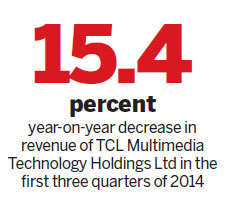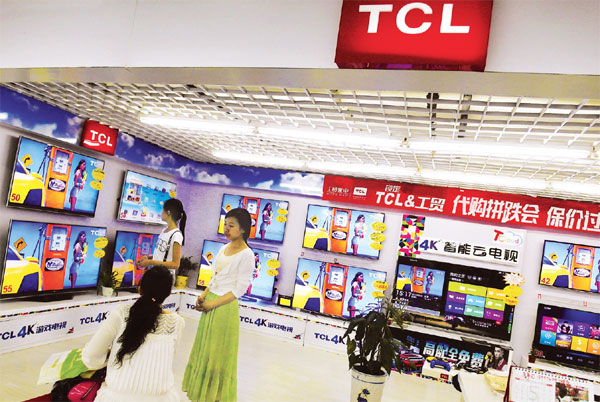TCL switches channels as times change
Updated: 2014-12-13 07:47
By Felix Gao in Hong Kong(HK Edition)
|
|||||||||
|
With sliding profits from hardware production, TV manufacturers are shifting to audience-oriented strategies. Asia News |
TCL Corporation - one of the largest consumer electronics enterprises on the mainland - is repositioning itself from a product-oriented TV set manufacturer to a user-oriented company, as the traditional TV set industry reaches saturation point.
In its new "intelligence plus internet" and "products plus services" strategy, the company set a five-year target to be rated among the global top three in smart TVs and smartphones, accumulating a clientele of up to 100 million household users and 100 million mobile users, and a 50-50 profit distribution between products and services.
TCL ranked fourth in the global LCD TV market in the first half of 2014 with a 5.5-percent market share, but topped the mainland rankings with a 17.1-percent market share in the same period.
However, the mainland TV set industry is slowing down. TCL Multimedia Technology Holdings Ltd, TCL's Hong Kong-listed TV unit, posted revenue of HK$23.6 billion ($3 billion) in the first three quarters, a 15.4-percent decrease compared to the same period a year earlier.
But TCL's mainland competitors did not turn in shining balance sheets either. Skyworth Digital Holdings posted revenues of HK$18.5 billion from April to September, a 7.7-percent drop year-on-year, while revenues at Sichuan Changhong Electric in the first nine months of 2014 dropped 1.8 percent from a year earlier to 41.3 billion yuan ($6.7 billion).
Hisense Co, however, bucked the trend, posting a 2.1-percent year-on-year revenue increase in the first three quarters.
"The mainland TV market has seen no increase in sales for the first time in years. The market environment is changing and fewer young people are watching TV," said Li Dongsheng, chairman of TCL Corporation.

Traditional TV set manufacturers are also challenged by newcomers like LeTV, a video website that launched its own Internet TV equipped with massive online video content.
Li said TCL is providing more software services, such as built-in applications, to improve the user experience for its products.
Huan TV, a TCL subsidiary and one of the mainland's biggest Internet smart TV service providers, reported a total active user count of more than 11 million in November, with daily average active users totaling 3.8 million.
"The increase in sales of traditional TV sets in the past few years was supported by the government's subsidy policy for rural consumers. But there's no such policy now," noted Kenny Tang Sing-hing, head of research at Redford Securities.
"Profits from hardware are low and TCL has to make money through services like video-on-demand and e-commerce. The company must follow the likes of LeTV and Xiaomi. I would be optimistic about TCL's future only if it carries out a successful transition," he said.
While LeTV is offering online video content, the Xiaomi set-top Mi Box and "smart" Mi TV aim to revolutionize television viewing.
TCL is setting up a cloud service platform with US networking multinational Cisco Systems in Guangzhou to offer services like video conferencing.
The company has also rented a building at Hong Kong Science and Technology Parks for a research and development center that would be its largest outside the mainland. Plans are to eventually base 1,000 staff there.
felix@chinadailyhk.com
(HK Edition 12/13/2014 page8)
